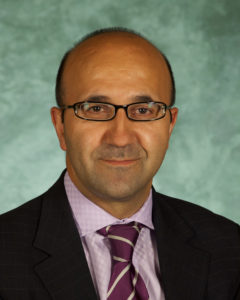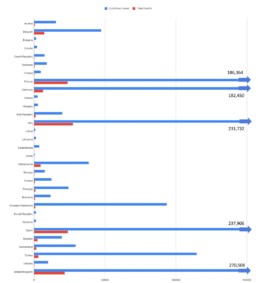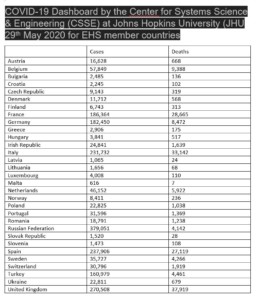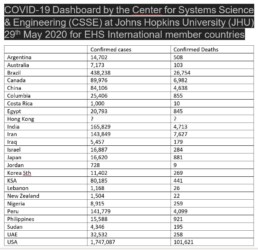 EHS Secretary General, Professor Eleftherios Tsiridis
EHS Secretary General, Professor Eleftherios Tsiridis
This webpage is dedicated to Covid-19’s effects on hip surgery in EHS member countries and will link to international literature on the pandemic to help keep our community abreast of the virus. Please email your publications on Covid-19 to the EHS Secretariat Office (samstokesehs@gmail.com). We look forward to your contributions.
This month we feature papers from two esteemed International Members of EHS in USA, Prof Javad Parvizi of the Rothman Institute at Thomas Jefferson University Hospital in Philadelphia and Assoc Prof Ran Schwarzkopf of NYU Hospital For Joint Diseases and NYU Langone Orthopedic Hospital. We also present articles by two Italian members, Prof Luigi Zagra, Chairman of the EHS SciCom, who was on the first front line in Europe’s Covid-19 outbreak, and our Nat Rep for Italy, Dr Nicola Santori, who updates EHS members on the situation in Rome. Next a paper on “Flattening the Covid Curve” published by my team in Injury. Finally, we invite you to kindly take our survey on resuming elective hip and knee replacement in the Pandemic. Closing date is 3rd June. Thank you.
The photo above is from our EHS Member and Fellow, Dr Vittorio Bellotti, from inside the OR in Barcelona, Spain. He says: “Sometimes a picture expresses better than many words. The guarantee of safety in major orthopaedic surgery is mandatory and in Covid’s Time, must be even higher. Both for the patient and for the surgeons.” Prof Manel Ribas, from the EHS SciCom, also adds from Barcelona: “Up to 22nd May, we’ve performed 131 procedures in our department, from those 23 hips. Today [25th May] just done 3 more. To date no eventualities related to Covid have been reported in our hospital, by following our “one way Save protocol”, protecting Covid-patients and those who > 2 months healed from SARS-CoV-2.”
Resuming Elective Orthopaedic Surgery During the COVID-19 Pandemic: Guidelines Developed by the International Consensus Group (ICM)
The Journal of Bone and Joint Surgery; Current Concepts Review; Published; Publish Ahead of Print; 10.2106/JBJS.20.00844; The article was first published on May 14, 2020.
J Parvizi*, T Gehrke*, C A Krueger, E Chisari, M Citak*, S Van Onsem, W L Walter, the International Consensus Group (ICM) and Research Committee of the American Association of Hip and Knee Surgeons (AAHKS) [*EHS members]

As we resume elective surgical procedures, it is important to understand what practices and protocols should be altered or implemented in order to minimize the risk of pathogen transfer during the severe acute respiratory syndrome (SARS)-CoV-2 pandemic.
- Each hospital and health system should consider their unique situation in terms of SARS-CoV-2 prevalence, staffing capabilities, personal protection equipment supply, and so on when determining how and when to implement these recommendations.
- All patients should be screened for SARS-CoV-2 by means of a thorough history and physical examination, as well as reverse transcription-polymerase chain reaction (RT-PCR) testing whenever possible, prior to undergoing elective surgery.
- Patients who are currently infected with coronavirus disease 2019 (COVID-19) should not undergo elective surgery.
- These guidelines are based on the available scientific evidence, albeit scant. The recommendations have been reviewed and voted on by the expert delegates who produced this document.
- Click here for PDF of article
- Click here to go to The Journal of Bone and Joint Surgery website
The Response of an Orthopedic Department and Specialty Hospital at the Epicenter of a Pandemic: The NYU Langone Health Experience
Ran Schwarzkopf*, Nolan A Maher, James D Slover, Eric J Strauss, Joseph A Bosco, Joseph D Zuckerman [*EHS Member]

As the world grapples with the COVID-19 pandemic, we as health care professionals thrive to continue to help our patients, and as orthopedic surgeons, this goal is ever more challenging. As part of a major academic tertiary medical center in New York City, the orthopedic department at New York University (NYU) Langone Health has evolved and adapted to meet the challenges of the COVID pandemic. In our report, we will detail the different aspects and actions taken by NYU Langone Health as well as NYU Langone Orthopedic Hospital and the orthopedic department in particular. Among the steps taken, the department has reconfigured its staff’s assignments to help both with the institution’s efforts and our patients’ needs from reassigning operating room nurses to medical COVID floors to having attending surgeons cover urgent care locations. We have reorganized our residency and fellowship rotations and assignments as well as adapting our educational programs to online learning. While constantly evolving to meet the institution’s and our patient demands, our leadership starts planning for the return to a new “normal”.. © 2020 Elsevier Inc. All rights reserved.
Disruption of Arthroplasty Practice in an Orthopedic Center in
Northern Italy During the Coronavirus Disease 2019 Pandemic
Rocco D’Apolito, Martina Faraldi, Immacolata Ottaiano, Luigi Zagra* [* EHS SciCom Chairman]
Received 16 April 2020; Received in revised form 18 April 2020; Accepted 19 April 2020; Available online
 Background: The Coronavirus disease 2019 (COVID-19) outbreak has put strain on many healthcare systems around the world, with important consequences. The aim of this paper is to describe the impact of the COVID-19 pandemic on hip and knee arthroplasties in an Italian high-volume orthopedic center, located in the region of the country first and worst affected by the Coronavirus.
Background: The Coronavirus disease 2019 (COVID-19) outbreak has put strain on many healthcare systems around the world, with important consequences. The aim of this paper is to describe the impact of the COVID-19 pandemic on hip and knee arthroplasties in an Italian high-volume orthopedic center, located in the region of the country first and worst affected by the Coronavirus.
Methods: Data from an institutional database were retrospectively analyzed to obtain the number of hip and knee arthroplasties performed from February 24 to April 10 2020. The figures were compared with those of the same 7-week period of the last year (2019).
Results: The number of hip and knee arthroplasties showed a decrease from 706 in the same period of 2019 to 166 (76.5% less) in the current year. In 2019, a mean of 101 ± 9 hip and knee arthroplasties were performed per week compared with a mean of 24 ± 34 in 2020. Ten patients tested positive for SARSCoV2 during their hospital stay. Two of these patients died after a regular postoperative period after developing unexpectedly COVID-19 during rehabilitation. The mortality in the 7-week period of the current year was 1.2% compared with 0% in 2019.
Conclusion: The outbreak of COVID-19 had a considerable effect in our center on the number of hip and knee arthroplasties that rapidly decreased to 0 in parallel to the worsening of the situation in the country. Efforts will be soon requested because our practice is going to deal with the after-effects of the pandemic in the near future. © 2020 Elsevier Inc. All rights reserved.
Additional articles by Prof Zagra on Covid-19 include:
- Zagra L, Faraldi M, Pregliasco F, Vinci A, Lombardi G, Ottaiano I, Accetta R, Perazzo P, D’Apolito R: Changes Of Clinical Activities In An Orthopaedic Institute In North Italy During The Spread Of COVID-19 Pandemic: A Seven-Week Observational Analysis. International Orthopaedics 2020 May 24. doi: 10.1007/s00264-020-04590-1. Online ahead of print. PMID: 32449043
- Athey AG, Cao L, Okazaki K, Zagra L, Castelli C, Kendoff D, Kerr J, Yates Jr. AJ, Stambough JB, Sierra RJ: Survey of AAHKS International Members on the Impact of COVID-19 on Hip and Knee Arthroplasty Practices, The Journal of Arthroplasty (2020): doi.org/10.1016/j.arth.2020.04.053
- Oussedik S, Zagra L, Shin GY, D’Apolito R, Haddad F: Reinstating elective orthopaedic surgery in the age of COVID. The Bone and Joint Journal (2020). In print
“Flattening the Curve” of COVID-19 pandemic in Orthopaedics and Trauma: the Greek perspective
Eustathios Kenanidis*, Eleftherios Tsiridis** [*EHS Member, **EHS Secretary General]
PMID: 32405090 PMCID: PMC7219378 DOI: 10.1016/j.injury.2020.05.015 Free PMC article
 Introduction
Introduction
Coronavirus disease (COVID-19) pandemic has altered the needs and provision of health care around the world [1]. The rapid spread of the new severe acute respiratory syndrome coronavirus 2 (SARSCoV-2) worldwide has forced all countries around the world to collaborate against the “common enemy” [2]. The emerging crisis, however, was variably managed from the health authorities of different countries; others were implementing early and strict measures of isolations levelling from social distancing to lock-down and others delaying such measures with the hope of early herd immunity [3]. Eventually the former approach was adopted by most of the countries, the effectiveness of which, along with the cooperation of the citizens playing a pivotal role in the outcome in morbidity and mortality from COVID-19. The COVID-19 pandemic had a more moderate impact in Greece compared to other countries [4]. The Greek experience concerning Orthopaedic and Trauma care is further presented in this letter…
EHS Nat Rep for Italy, Nicola Santori, on Covid-19
 Rome 4th May 2020
Rome 4th May 2020
Dear colleagues,
Italy has been the first and one of the European countries hit hardest by the recent pandemic Here we have had big regional differences in the incidence of deaths and infections due to covid 19. Almost 90% of the dead are concentrated in the “high spread” provinces of Northern Italy. As for the other areas, 8% of coronavirus deaths occurred in the “medium spread” areas, while 3% in those with the lowest spread. In particular, there are 38 provinces in which the coronavirus has made the most victims, these are “3,271 municipalities, 37 northern provinces plus Pesaro and Urbino”.
I remained in close contact with many colleagues in the affected areas, and I followed with trepidation the evolution of the disease of several dear friends who fell ill. Several orthopedic colleagues, especially in Lombardy, Emilia Romagna and Piedmont, have been personally involved in the treatment of both trauma and standard covid patients. I am, like all Italians, immensely grateful to all these colleagues who put themselves nobly at the service of the country.
Elective surgery, and therefore also all hip surgery, was discontinued throughout the country apart from a few selected centers where the most serious cases, mostly infections where it was not possible to postpone the treatment, were concentrated. A collaboration between public and private hospitals was started and has been working very well so far.
Here in Rome, where I live, we have been lucky, mostly because a rather timely lockdown has limited the number of cases. Today, the 4th of May, the country is slowly starting to ease the restrictions although the ‘social distancing’ measures and many other limitations are still in place.
In my region the infection rates are now very low. This week I start working in my facility again, under strict requirements. For the moment, patients under the age of 60 and with no associated significant diseases have been selected. This is for two reasons. First to protect the weakest people and second to try to send patients directly home, avoiding transfers to physiotherapy facilities. I fear it will take quite sometimes to go back to full operative capacity. Patients and employees with risk factors are very scared, and rightly so. It is very difficult to say whether it is too early or too late and how to proceed, none of us have ever seen a pandemic such as this in his life. I understand, even in the north, many hospitals are restarting surgery between this and the next week, even though the policy it is very heterogeneous.
All meetings have been cancelled or postponed but a very active web based scientific activity has been implemented and I, as many other colleagues, have been very busy with webinars, lessons, video-conferences, and many other activities. Since I believe this revolution will last for quite a long time it is interesting to guess how and if it will affect permanently our educational world. We will see.
I am really looking forward to the next meeting in Lille 2021, it seems so far in the future but it is not. It will certainly be a success and opportunity to tighten our great community.
My very best wishes to you all.
Your sincerely,
Nicola Santori MD, PhD




